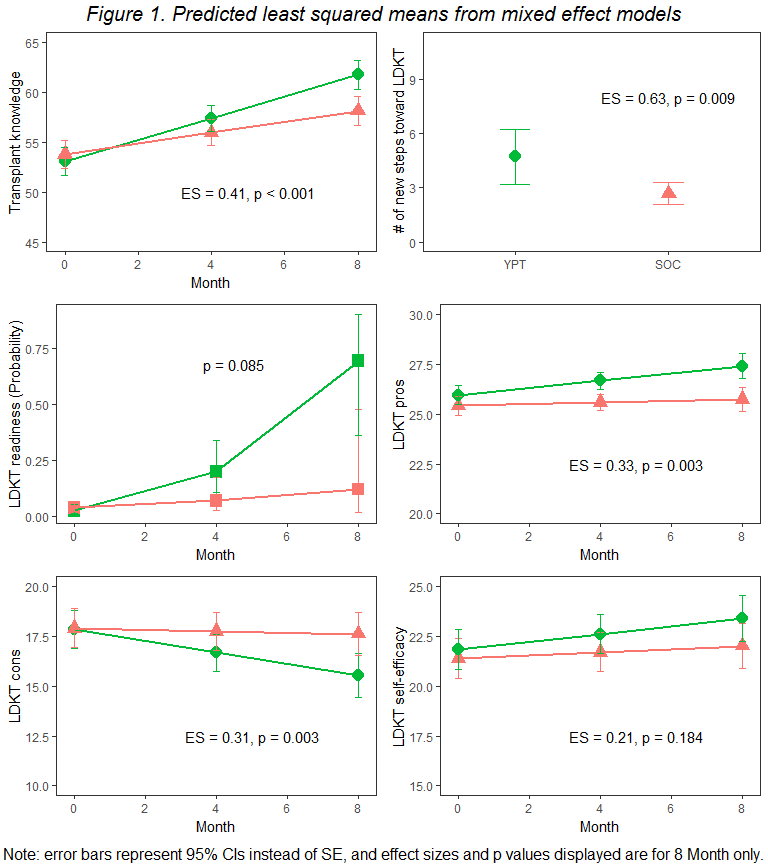Your Path to Transplant Education Increases Patients’ Transplant Knowledge, Attitudes, Informed Decision-Making, and Pursuit: An Randomized Controlled Trial
A. D. Waterman1, Y. Cui2, J. D. Peipert3, J. L. Beaumont2, C. S. Anderson1, A. L. Paiva4, M. L. Robbins4
1Division of Nephrology, University of California, Los Angeles, Los Angeles, CA, 2Terasaki Research Institute, Los Angeles, CA, 3Department of Medical Social Sciences, Northwestern University, Chicago, IL, 4Department of Psychology, University of Rhode Island, Kingston, RI
Meeting: 2019 American Transplant Congress
Abstract number: 242
Keywords: Efficacy, Kidney transplantation, Psychosocial
Session Information
Session Name: Concurrent Session: Kidney Psychosocial I: Cognitive and Behavioral Factors
Session Type: Concurrent Session
Date: Monday, June 3, 2019
Session Time: 2:30pm-4:00pm
 Presentation Time: 3:06pm-3:18pm
Presentation Time: 3:06pm-3:18pm
Location: Room 302
*Purpose: Most kidney transplant (KT) education is “one-size-fits-all” where patients’ unique gaps in knowledge, challenges, and level of readiness to pursue KT and living donor kidney transplant (LDKT) are not addressed. This randomized controlled trial compared the effectiveness of Your Path to Transplant (YPT), where coaching and education was computer-tailored using assessments of potential KT recipients’ readiness, knowledge, transplant derailers, and self-efficacy at 3 time points during transplant evaluation and compared against standard of care (SOC) education provided by University of California, Los Angeles Kidney and Pancreas Transplant Program (UCLA-KPTP). Changes in transplant knowledge, readiness, pro-and con-KT attitudes, self-efficacy, and small steps toward KT were assessed prior to presenting for evaluation (baseline), and 4- and 8-months afterwards.
*Methods: From 2016-2018, we recruited 802 patients at UCLA-KPTP for the trial (34.7% White; 24.9% Black; 39.0% Hispanic). Outcomes comparisons between patients receiving SOC (n=395) and YPT (n=407) were conducted under an intent-to-treat approach with mixed effects models and repeated measures ANOVA. Standardized effect sizes (ES) comparing the magnitude of difference in outcomes were interpreted with the following cut-offs: 0.20 < ES < 0.50 = small; 0.50 < ES < 0.80 = medium; > 0.80 = large.
*Results: Compared to SOC, significant increases in KT knowledge were observed for the YPT group at 8 months (ES = 0.42) (Figure 1). Over time, increases in Pros to LDKT (ES = 0.41, p < 0.001), total new steps toward LDKT (ES = 0.63, p = 0.009), LDKT readiness (p = 0.085), and LDKT self-efficacy (ES = 0.21, p = 0.184) were observed for YPT compared to SOC. Decreases in Cons to LDKT (ES = 0.31, p = 0.003) were also observed for YPT compared to SOC. Patients receiving YPT were more likely to ask potential donors to be tested (65.9% vs. 48.3%, p = 0.002). There were no differences in treatment effects by race.
*Conclusions: The YPT education program is efficacious in increasing KT knowledge, pro-KT attitudes, informed KT decision-making, and KT pursuit for kidney patients pursuing transplant evaluation.
To cite this abstract in AMA style:
Waterman AD, Cui Y, Peipert JD, Beaumont JL, Anderson CS, Paiva AL, Robbins ML. Your Path to Transplant Education Increases Patients’ Transplant Knowledge, Attitudes, Informed Decision-Making, and Pursuit: An Randomized Controlled Trial [abstract]. Am J Transplant. 2019; 19 (suppl 3). https://atcmeetingabstracts.com/abstract/your-path-to-transplant-education-increases-patients-transplant-knowledge-attitudes-informed-decision-making-and-pursuit-an-randomized-controlled-trial/. Accessed March 3, 2026.« Back to 2019 American Transplant Congress

